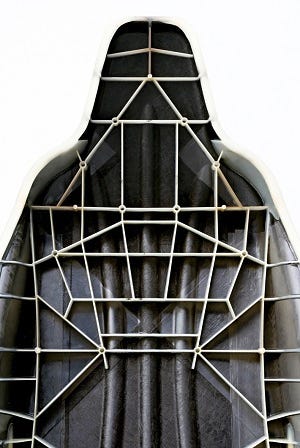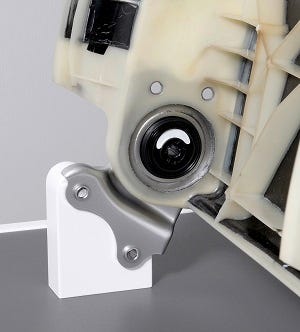Within four or so years, plastic-centric automotive seats could be more than 40 percent lighter than conventionally manufactured metal-intensive seat structures if a research project at Johnson Controls (Plymouth, MI) proceeds to fruition. And safety reportedly will not be compromised in the process.
December 4, 2014
Within four or so years, plastic-centric automotive seats could be more than 40 percent lighter than conventionally manufactured metal-intensive seat structures if a research project at Johnson Controls (Plymouth, MI) proceeds to fruition. And safety reportedly will not be compromised in the process.
|
A seat structure from Johnson Controls' CAMISMA (carbon-amide-metal-based interior structure using a multi-material system approach) research project. These seats are more than 40 percent lighter than conventionally manufactured seat structures and equally as safe |
|
A recliner used in Johnson Controls' CAMISMA seat research project. |
The Johnson Controls project, dubbed the CAMISMA (carbon-amide-metal-based interior structure using a multi-material system approach) research project targets reduction in the use of metals in vehicle seat structures by replacing them with multi-material system. Specifically, future generation seats will employ carbon fiber-reinforced polyamide (PA) compounds.
For this cutting-edge work, Johnson Controls received this year's CLEPA (European Association of Automotive Suppliers) Innovation Award in the "Green" category. According to the jury, the project represents an "outstanding, future-oriented solution for sustainable carbon dioxide reduction."
"Although carbon-fiber products generally offer outstanding characteristics, such as great strength and design flexibility, they are too expensive for use in the large-scale series production of vehicles," said Andreas Eppinger, group vice president technology management, Johnson Controls Automotive Experience. "With CAMISMA, our goal was to create cost-efficient, sustainable access to carbon-fiber-based materials systems."
This was achieved by an innovative industrial manufacturing process for volume production with about 200,000 units per production line, allowing for the first time the highly concentrated, efficient use of carbon fiber, while at the same time meeting all safety requirements.
The results of an initial rear-impact crash test demonstrated that the CAMISMA seat prototype satisfied all of the strength requirements of current seats built with a metal structure in large-scale series production.
In addition to significant weight savings, CAMISMA offers a further advantage: The manufacturing steps required in assembly are substantially reduced through the number of attachment parts needed, which also saves cost. These seats will be available in vehicles in 2019.
About the Author(s)
You May Also Like




